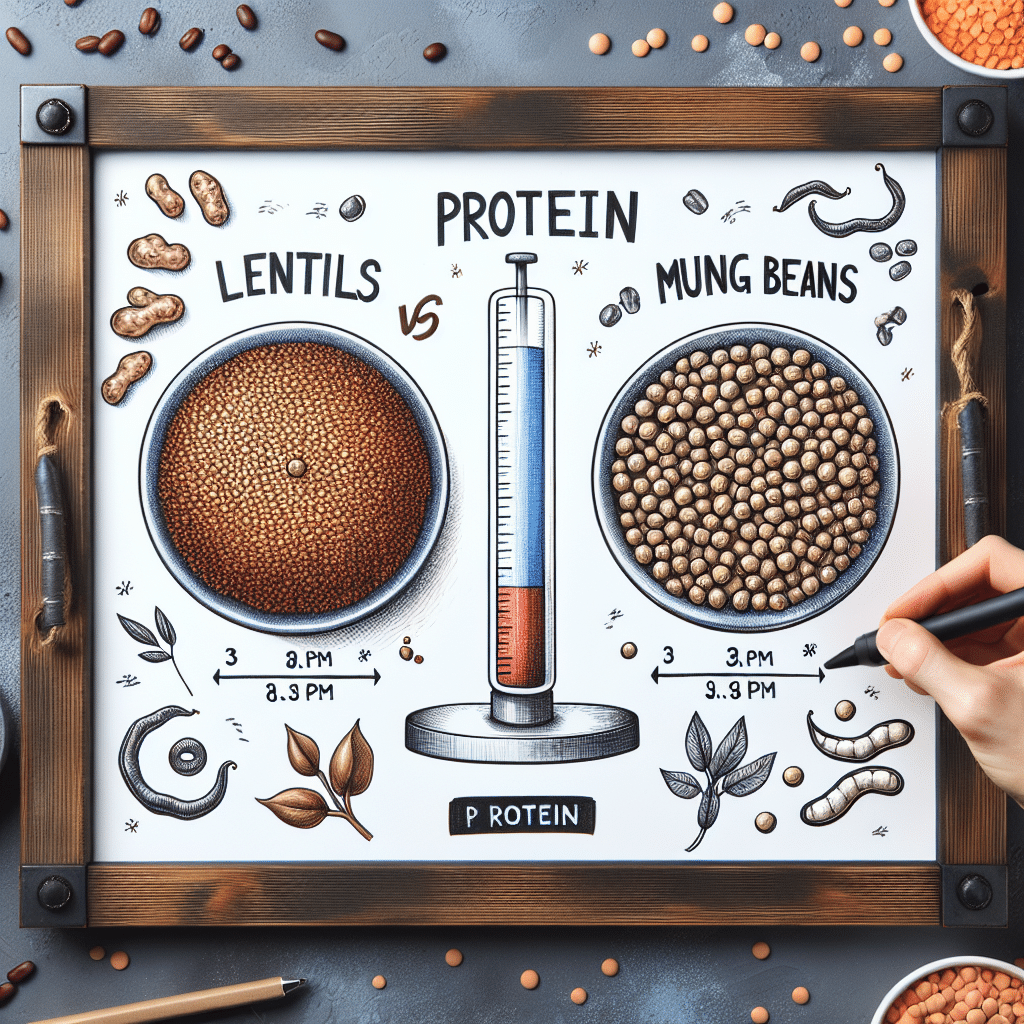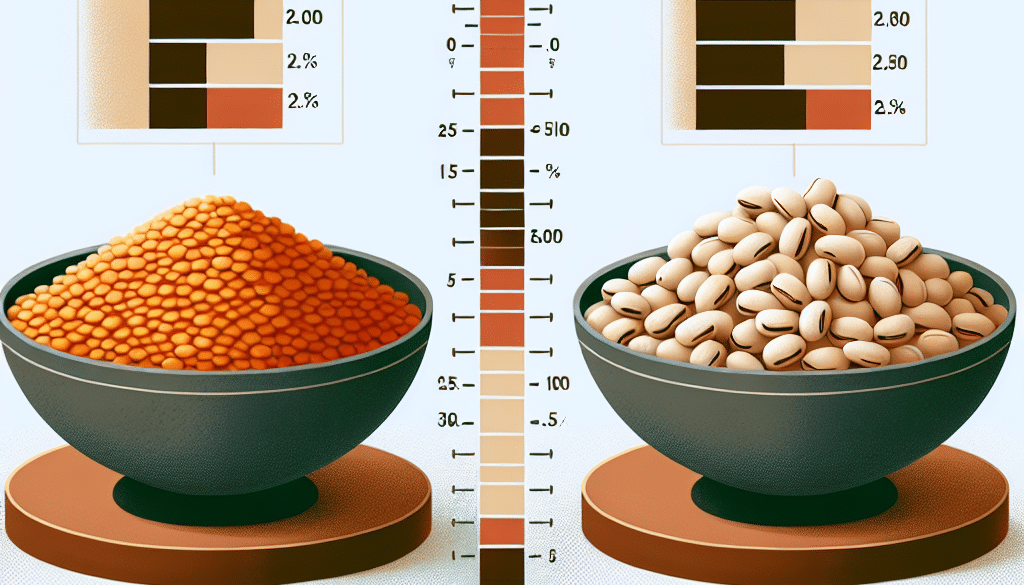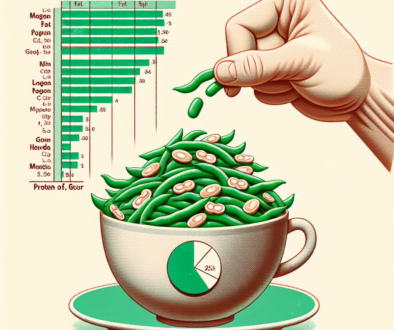Which Has More Protein Lentils Or Mung Beans?
-
Table of Contents
- Protein Showdown: Lentils vs. Mung Beans
- Nutritional Overview of Lentils
- Nutritional Overview of Mung Beans
- Comparing Protein Content
- Health Benefits Beyond Protein
- Lentils for Heart Health and Blood Sugar Control
- Mung Beans for Digestive Health and Weight Management
- Environmental Impact and Sustainability
- How to Incorporate Lentils and Mung Beans into Your Diet
- Conclusion: A Close Protein Contest
- Discover ETprotein’s High-Quality Protein Products
Protein Showdown: Lentils vs. Mung Beans

When it comes to plant-based proteins, lentils and mung beans are two of the most popular and nutritious options available. Both are staples in many diets around the world and are celebrated for their health benefits and versatility in cooking. But which of these legumes packs a higher protein punch? This article delves into the nutritional profiles of lentils and mung beans to determine which one offers more protein, along with other health benefits.
Nutritional Overview of Lentils
Lentils are a type of legume known for their lens-shaped seeds. They come in a variety of colors, including brown, green, yellow, and red. Lentils are not only rich in protein but also in dietary fiber, vitamins, and minerals. They are particularly high in folate, iron, and potassium.
- Protein content: Lentils typically contain about 9 grams of protein per 100 grams when cooked.
- Dietary fiber: They are an excellent source of fiber, with around 8 grams per 100 grams, which aids in digestion and promotes a feeling of fullness.
- Other nutrients: Lentils are also a good source of B vitamins, magnesium, zinc, and phosphorus.
Nutritional Overview of Mung Beans
Mung beans, also known as green gram, are small, green legumes that are commonly used in Asian cuisines. They can be eaten whole, sprouted, or split with the hulls removed. Mung beans are not only high in protein but also contain essential amino acids, making them a complete protein source.
- Protein content: Mung beans offer about 7 grams of protein per 100 grams when cooked.
- Dietary fiber: They provide around 8 grams of fiber per 100 grams, contributing to digestive health.
- Other nutrients: Mung beans are rich in potassium, magnesium, folate, and vitamin B6.
Comparing Protein Content
When directly comparing the protein content of lentils and mung beans, lentils appear to have a slight edge. However, the difference is not substantial, and both are excellent sources of plant-based protein. The choice between lentils and mung beans may come down to personal preference or specific dietary needs.
Health Benefits Beyond Protein
While protein content is a significant factor in choosing between lentils and mung beans, it’s essential to consider the broader spectrum of health benefits that these legumes offer.
Lentils for Heart Health and Blood Sugar Control
Lentils are particularly beneficial for heart health due to their high fiber content, which can help lower cholesterol levels. They also have a low glycemic index, making them an excellent food choice for managing blood sugar levels.
Mung Beans for Digestive Health and Weight Management
Mung beans are known for their ease of digestion, especially when sprouted. They are also low in calories, which can be helpful for weight management. The high fiber content in mung beans helps in preventing constipation and promoting a healthy gut.
Environmental Impact and Sustainability
Both lentils and mung beans have a lower environmental footprint compared to animal-based proteins. They require less water and land to grow and emit fewer greenhouse gases. This makes them a sustainable choice for those looking to reduce their environmental impact.
How to Incorporate Lentils and Mung Beans into Your Diet
Both lentils and mung beans are incredibly versatile and can be used in a variety of dishes. Here are some ideas:
- Lentils: Use them in soups, stews, salads, and as a meat substitute in dishes like lentil loaf or veggie burgers.
- Mung Beans: Enjoy them in stir-fries, curries, salads, or as a base for veggie patties. Sprouted mung beans are also a crunchy addition to wraps and sandwiches.
Conclusion: A Close Protein Contest
In the battle of protein content between lentils and mung beans, lentils come out slightly ahead. However, both legumes are nutritious powerhouses that offer a wealth of health benefits. Whether you choose lentils for their higher protein content or mung beans for their digestibility, incorporating these legumes into your diet is a smart move for your health and the planet.
Discover ETprotein’s High-Quality Protein Products
If you’re looking to enhance your diet with additional protein sources, consider ETprotein’s range of organic bulk vegan proteins. Their mung bean protein is an excellent choice for those seeking a plant-based protein boost. ETprotein’s products are characterized by their neutral taste, non-GMO, and allergen-free attributes, ensuring you get the highest quality protein supplements.
About ETprotein:
ETprotein, a reputable protein and L-(+)-Ergothioneine (EGT) Chinese factory manufacturer and supplier, is renowned for producing, stocking, exporting, and delivering the highest quality organic bulk vegan proteins and L-(+)-Ergothioneine. They include Organic rice protein, clear rice protein, pea protein, clear pea protein, watermelon seed protein, pumpkin seed protein, sunflower seed protein, mung bean protein, peanut protein, and L-(+)-Ergothioneine EGT Pharmaceutical grade, L-(+)-Ergothioneine EGT food grade, L-(+)-Ergothioneine EGT cosmetic grade, L-(+)-Ergothioneine EGT reference grade and L-(+)-Ergothioneine EGT standard. Their offerings, characterized by a neutral taste, non-GMO, allergen-free attributes, with L-(+)-Ergothioneine purity over 98%, 99%, cater to a diverse range of industries. They serve nutraceutical, pharmaceutical, cosmeceutical, veterinary, as well as food and beverage finished product distributors, traders, and manufacturers across Europe, USA, Canada, Australia, Thailand, Japan, Korea, Brazil, and Chile, among others.
ETprotein specialization includes exporting and delivering tailor-made protein powder and finished nutritional supplements. Their extensive product range covers sectors like Food and Beverage, Sports Nutrition, Weight Management, Dietary Supplements, Health and Wellness Products, and Infant Formula, ensuring comprehensive solutions to meet all your protein needs.
As a trusted company by leading global food and beverage brands and Fortune 500 companies, ETprotein reinforces China’s reputation in the global arena. For more information or to sample their products, please contact them and email sales(at)ETprotein.com today.












